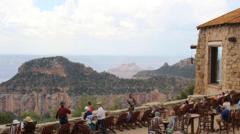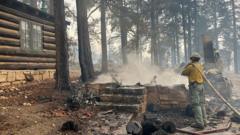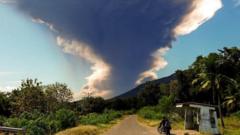Wildfires raging across Manitoba have led to mandatory evacuations and the declaration of a second state of emergency this year, with experts warning that conditions are likely to worsen.
Vast Wildfires Prompt Second State of Emergency in Manitoba

Vast Wildfires Prompt Second State of Emergency in Manitoba
Record Burn Area Affects Thousands, Spike in Evacuations Amid Climate Threat
The province of Manitoba has declared a state of emergency as wildfires threaten vast areas, leading to an unprecedented evacuation of thousands of residents. As of Friday, over 100 wildfires were ablaze, scorching approximately 2.5 million acres, and positioning Manitoba on track for its most extensive wildfire damage since 1994.
The situation has escalated as reports indicate that multiple fires remain out of control, exacerbated by sustained higher temperatures typical for the summer months. The wildfire season in Canada, which occurs from March to October, has intensified, predominantly due to lightning strikes that ignite the flames.
Mandatory evacuation orders were issued for nine communities, including Snow Lake and the Garden Hill First Nation, with evacuation efforts focusing on safeguarding residents from the encroaching flames. Premier Wab Kinew emphasized the urgent need for shelter facilities for the evacuees, who are being accommodated in venues such as Winnipeg's Billy Mosienko Arena and RBC Convention Center.
Meanwhile, the federal government has deployed an air force plane to assist in the transportation of those affected. The premier voiced his appreciation for the support from American firefighters joining the effort to control the wildfires but also criticized U.S. Congress members for using the crisis as a political tool. He specifically referenced a letter from Republican representatives urging the Canadian government to address the fires, which have had repercussions such as smoke drifting into bordering states, affecting summer activities.
This declaration marks Manitoba’s second state of emergency in 2025, following another earlier this year due to wildfires that resulted in fatalities and significant evacuations affecting 30,000 individuals. With environmental conditions posing ongoing challenges, there is a heightened focus on disaster management and community resilience in the face of these devastating wildfires.
The situation has escalated as reports indicate that multiple fires remain out of control, exacerbated by sustained higher temperatures typical for the summer months. The wildfire season in Canada, which occurs from March to October, has intensified, predominantly due to lightning strikes that ignite the flames.
Mandatory evacuation orders were issued for nine communities, including Snow Lake and the Garden Hill First Nation, with evacuation efforts focusing on safeguarding residents from the encroaching flames. Premier Wab Kinew emphasized the urgent need for shelter facilities for the evacuees, who are being accommodated in venues such as Winnipeg's Billy Mosienko Arena and RBC Convention Center.
Meanwhile, the federal government has deployed an air force plane to assist in the transportation of those affected. The premier voiced his appreciation for the support from American firefighters joining the effort to control the wildfires but also criticized U.S. Congress members for using the crisis as a political tool. He specifically referenced a letter from Republican representatives urging the Canadian government to address the fires, which have had repercussions such as smoke drifting into bordering states, affecting summer activities.
This declaration marks Manitoba’s second state of emergency in 2025, following another earlier this year due to wildfires that resulted in fatalities and significant evacuations affecting 30,000 individuals. With environmental conditions posing ongoing challenges, there is a heightened focus on disaster management and community resilience in the face of these devastating wildfires.

















